













|
MANAGING
The Near-Death Hall Of Fame
It's easy to make a wrong career move.
But the experience of some Indian execs shows it's possible to make a
comeback. Here's how.
By Seema
Shukla
 "I'd never felt this kind of fear
before. My entire career flashed before my eyes in a few instants. The
immediate-future had never looked more uncertain...'' The speaker paused
for effect, but spoilt it by taking a sip from the cup of coffee on the
table before him; his table, a typical I-am-obviously-not-real-wood piece
of office furniture, and the coffee was standard vending-machine fare that
came in a Styrofoam cup, not a mocha from the nearest coffee bar. The man
was obviously mouthing lines he thought I wished to hear mouthed (and I
did these); he was a good actor, but not good enough. I put a cross
against his name in my pad, another dud. "I'd never felt this kind of fear
before. My entire career flashed before my eyes in a few instants. The
immediate-future had never looked more uncertain...'' The speaker paused
for effect, but spoilt it by taking a sip from the cup of coffee on the
table before him; his table, a typical I-am-obviously-not-real-wood piece
of office furniture, and the coffee was standard vending-machine fare that
came in a Styrofoam cup, not a mocha from the nearest coffee bar. The man
was obviously mouthing lines he thought I wished to hear mouthed (and I
did these); he was a good actor, but not good enough. I put a cross
against his name in my pad, another dud.
In some ways, it was almost disappointing.
On my quest for careers that had been resurrected, ''brought back from the
edge of the precipice,'' as my overwrought editor put it, I'd expected to
encounter far more graphic descriptions of corporate near-death
experiences. I'd expected to meet with thankful executives recounting
moments of sudden epiphanies when they realised their careers were in
trouble, big trouble, but that hadn't happened. That the 10-odd executives
I spoke to had gone through the corporate equivalent of a near-death
experience wasn't in doubt. It was equally evident that none was the worse
off for having made a gigantic career blunder.
Piyush Gupta, dotcom India's poster boy for
all of the eight months he headed go4i.com, is back where he came from,
Citibank. When he left the bank, he was head of its Indonesian operations
and on the fast-track. Today, he is in-charge of the online initiatives of
the bank in Asia, and, on a faster-track. ''I have no regrets,'' says
Gupta, who has no reason to have any-his dotcom experience may have well
helped him land this assignment. ''Most people who have gone through such
an experience in their career will benefit in the long run.''
Then there is R. Shyam Sundar, arguably,
one of the country's finest consumer marketers, who left SmithKlineBeecham
for Max New York Life. Five months after he joined, and a full six months
before the business rolled out, he was out again. One headhunter says
Sundar joined Max NYL too soon, before the company could find a CEO, and
when it did discover Anuroop 'Tony' Singh, he wanted to put his own team
in place. So, Sundar did a born-again thing, and ended up as head of
marketing at Dabur India's healthcare division. Soft landing, that.
|
Back On Track
A few good men who bounced back. |
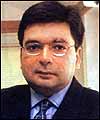 |
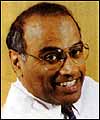 |
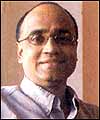 |
 |
NAME:
Alok Vajpeyi
FROM: Head (Research), BZW
MIS-CHANGE: Six years of serial
entrepreneurism: a corporate finance business, advertising agency,
and parenting magazine
TO: COO, DSP Merrill Lynch |
NAME:
A Thyagarajan
FROM: Managing Director, ABB
MIS-CHANGE: Vice-Chairman of
Wipro and CEO of Wipro Infotech
TO: President, H-P India |
NAME:
R.Shyam Sunder
FROM: Head (Marketing),
SmithKlineBeecham Consumer Healthcare
MIS-CHANGE: Head (Marketing) Max
New York Life
TO: Head (Marketing)
healthcare division, Dabur |
NAME:
Piyush Gupta
FROM: Head (Indonesian
Operations),Citibank
MIS-CHANGE: CEO, Go4i.com
TO: Head (Asian net initiative),
Citibank |
 |
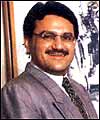 |
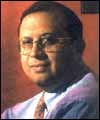 |
|
NAME:
Yogi Sriram
FROM: Head (Corporate
Personnel), ABB
MIS-CHANGE: Vice-President (HR),
Dabur
TO: Head (HR) Larsen &
Tourbo |
NAME:
Manoj Kohli
FROM: Head (HR), Escotel
MIS-CHANGE: Executive Director
(Operations), Allied Signal
TO: CEO, Escotel |
NAME:
B. Anantharaman
FROM: CFO, Goodyear India
MIS-CHANGE: President and CFO,
Indorama Group
TO: CFO, Max India |
|
|
It can happen in a hyped up industry like
horizontal portals; it can happen in a sunrise industry like insurance; it
can even happen in a mature industry like chemicals and aircraft-parts. In
1996, after a decade and half with the DCM Group, Manoj Kohli moved to
Escotel as head of its human resources function. Eighteen months later he
got what he considered his biggest break, an opportunity to be the
Executive Director in charge of operations of transnational Allied Signal
that had (in those days) ambitious investment plans for India. The
investments never happened, Allied Signal decided to focus on China, then
got taken over by Honeywell, and Kohli left. ''I realised that if Allied
Signal wasn't growing, there was no way I (my career) could'', reminisces
Kohli. His destination: Escotel. His designation: CEO.
Picking up the pieces without getting
hurt
10
ways to resurrect your career
Atul Vohra of head hunter
major Heidrick & Struggles offer some smart tips on rebuilding
careers. |
| 1.
Make sure your reason to move is not teething
pains |
| 2.
Do not make a hasty/unplanned change |
| 3.
Network extensively to increase your visibility |
| 4.
Take a look at opportunities in the existing company |
| 5.
Define the industry and/or position for your next move |
| 6.
Use the time and opportunity to learn |
| 7.
Stay positive-you have a track record behind you |
| 8.
Seek advice from a reputed executive search professional |
| 9.
Never let your performance slip |
| 10.
Be very selective about who you confide in |
Time was when a bad career move spelled
d-e-a-t-h, especially for senior executives. That things have changed is
apparent from the three instances reported (one is an accident, two is a
happening, three is a definite trend). Strapped as they are for competent
professionals-and things get really tight at the senior management
level-companies are no longer averse to hiring, well, failures. Not
failures in the conventional sense of the word-like Coke's Sergio Zyman
who managed to live down the New Coke debacle (he was the man in-charge of
the project) to become the company's marketing head-but failures in terms
of making a wrong career move. ''Today, there are lots of senior positions
going and few people to fill them, so executives who have made a wrong
move or two, still get a look in,'' says Rajinder Sinh, the head of hr at
HFCL.
B. Anatharaman found that out to his
surprise. The 46-year old chartered accountant spent 17 years with
tyre-major Goodyear in various parts of the world. Not happy about being
asked to shift to the company's Indian arm which wasn't exactly setting
the roads ablaze, he moved to the Indorama Group as President and CFO. The
change from a professional, transnational culture, to an entrepreneurial,
family-managed one didn't suit Anantharaman and when the Max Group offered
him the post of CFO he jumped ship. ''I didn't expect an offer so soon,
but I was happy to get out,'' concedes Anantharaman.
Expect to hear more stories like Sundar's
and Anantharaman's says Preety Kumar, the CEO of search firm Amrop
International. ''It's happening more now. And will continue to do so as
people keep pace with the economic environment by shifting jobs.'' If such
changes do not always work out, blame it on the inability of individuals
to cope with a change in culture, unrealistic expectations on the
responsibilities that come with the new position, or simply, the
unwillingness to deal with the uncertainty associated with several
start-up situations.
A surprise move followed by an even more
surprising exit doesn't look good on resumes. ''You have to be able to
justify why you moved out,'' says R. Suresh, the CEO of another search
firm, Stanton Chase. ''It is essential to give yourself time in a new
situation. If things still don't work out, walk out.'' Pumping the Rolodex
helps. As do keeping in touch with people and happenings in one's previous
company and industry, and being candid about why things didn't work out.
But even the worst of career moves has some things going for it. Kohli,
for instance, learnt all about the Six Sigma process and how it could be
applied to non-manufacturing contexts at Allied Signal. It was Larry
Bossidy, then Allied Signal Inc.'s chairman who introduced the concept to
former colleague and golfing buddy Jack Welch.
There is, of course, such a thing as making
a wrong move once too often. ''If it has happened to the same guy twice,
our warning antennae go up,'' agrees Kumar. That's the caveat, then. The
best of managers can make mistakes and end up in a dead-end company, a
no-future job, or with a sadistic, control-freak CEO. India Inc., will
allow them one mistake, and just that. Cats may have nine lives; careers
have just two.
|

